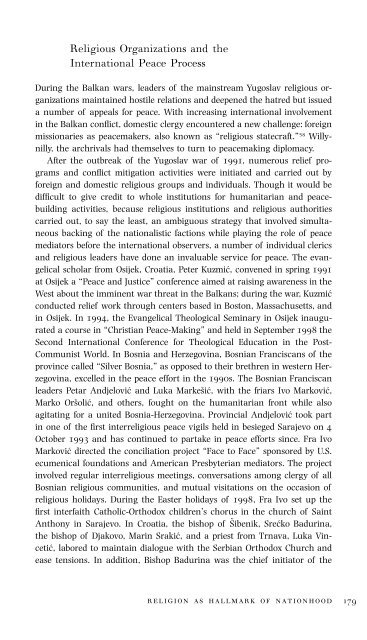Balkan Idols: Religion and Nationalism in Yugoslav States
Balkan Idols: Religion and Nationalism in Yugoslav States
Balkan Idols: Religion and Nationalism in Yugoslav States
You also want an ePaper? Increase the reach of your titles
YUMPU automatically turns print PDFs into web optimized ePapers that Google loves.
Religious Organizations <strong>and</strong> the<br />
International Peace Process<br />
Dur<strong>in</strong>g the <strong>Balkan</strong> wars, leaders of the ma<strong>in</strong>stream <strong>Yugoslav</strong> religious organizations<br />
ma<strong>in</strong>ta<strong>in</strong>ed hostile relations <strong>and</strong> deepened the hatred but issued<br />
a number of appeals for peace. With <strong>in</strong>creas<strong>in</strong>g <strong>in</strong>ternational <strong>in</strong>volvement<br />
<strong>in</strong> the <strong>Balkan</strong> conflict, domestic clergy encountered a new challenge: foreign<br />
missionaries as peacemakers, also known as “religious statecraft.” 58 Willynilly,<br />
the archrivals had themselves to turn to peacemak<strong>in</strong>g diplomacy.<br />
After the outbreak of the <strong>Yugoslav</strong> war of 1991, numerous relief programs<br />
<strong>and</strong> conflict mitigation activities were <strong>in</strong>itiated <strong>and</strong> carried out by<br />
foreign <strong>and</strong> domestic religious groups <strong>and</strong> <strong>in</strong>dividuals. Though it would be<br />
difficult to give credit to whole <strong>in</strong>stitutions for humanitarian <strong>and</strong> peacebuild<strong>in</strong>g<br />
activities, because religious <strong>in</strong>stitutions <strong>and</strong> religious authorities<br />
carried out, to say the least, an ambiguous strategy that <strong>in</strong>volved simultaneous<br />
back<strong>in</strong>g of the nationalistic factions while play<strong>in</strong>g the role of peace<br />
mediators before the <strong>in</strong>ternational observers, a number of <strong>in</strong>dividual clerics<br />
<strong>and</strong> religious leaders have done an <strong>in</strong>valuable service for peace. The evangelical<br />
scholar from Osijek, Croatia, Peter Kuzmić, convened <strong>in</strong> spr<strong>in</strong>g 1991<br />
at Osijek a “Peace <strong>and</strong> Justice” conference aimed at rais<strong>in</strong>g awareness <strong>in</strong> the<br />
West about the imm<strong>in</strong>ent war threat <strong>in</strong> the <strong>Balkan</strong>s; dur<strong>in</strong>g the war, Kuzmić<br />
conducted relief work through centers based <strong>in</strong> Boston, Massachusetts, <strong>and</strong><br />
<strong>in</strong> Osijek. In 1994, the Evangelical Theological Sem<strong>in</strong>ary <strong>in</strong> Osijek <strong>in</strong>augurated<br />
a course <strong>in</strong> “Christian Peace-Mak<strong>in</strong>g” <strong>and</strong> held <strong>in</strong> September 1998 the<br />
Second International Conference for Theological Education <strong>in</strong> the Post-<br />
Communist World. In Bosnia <strong>and</strong> Herzegov<strong>in</strong>a, Bosnian Franciscans of the<br />
prov<strong>in</strong>ce called “Silver Bosnia,” as opposed to their brethren <strong>in</strong> western Herzegov<strong>in</strong>a,<br />
excelled <strong>in</strong> the peace effort <strong>in</strong> the 1990s. The Bosnian Franciscan<br />
leaders Petar Andjelović <strong>and</strong> Luka Markesˇić, with the friars Ivo Marković,<br />
Marko Orsˇolić, <strong>and</strong> others, fought on the humanitarian front while also<br />
agitat<strong>in</strong>g for a united Bosnia-Herzegov<strong>in</strong>a. Prov<strong>in</strong>cial Andjelović took part<br />
<strong>in</strong> one of the first <strong>in</strong>terreligious peace vigils held <strong>in</strong> besieged Sarajevo on 4<br />
October 1993 <strong>and</strong> has cont<strong>in</strong>ued to partake <strong>in</strong> peace efforts s<strong>in</strong>ce. Fra Ivo<br />
Marković directed the conciliation project “Face to Face” sponsored by U.S.<br />
ecumenical foundations <strong>and</strong> American Presbyterian mediators. The project<br />
<strong>in</strong>volved regular <strong>in</strong>terreligious meet<strong>in</strong>gs, conversations among clergy of all<br />
Bosnian religious communities, <strong>and</strong> mutual visitations on the occasion of<br />
religious holidays. Dur<strong>in</strong>g the Easter holidays of 1998, Fra Ivo set up the<br />
first <strong>in</strong>terfaith Catholic-Orthodox children’s chorus <strong>in</strong> the church of Sa<strong>in</strong>t<br />
Anthony <strong>in</strong> Sarajevo. In Croatia, the bishop of S ˇ ibenik, Srećko Badur<strong>in</strong>a,<br />
the bishop of Djakovo, Mar<strong>in</strong> Srakić, <strong>and</strong> a priest from Trnava, Luka V<strong>in</strong>cetić,<br />
labored to ma<strong>in</strong>ta<strong>in</strong> dialogue with the Serbian Orthodox Church <strong>and</strong><br />
ease tensions. In addition, Bishop Badur<strong>in</strong>a was the chief <strong>in</strong>itiator of the<br />
religion as hallmark of nationhood 179


